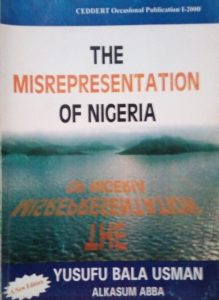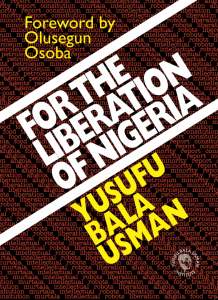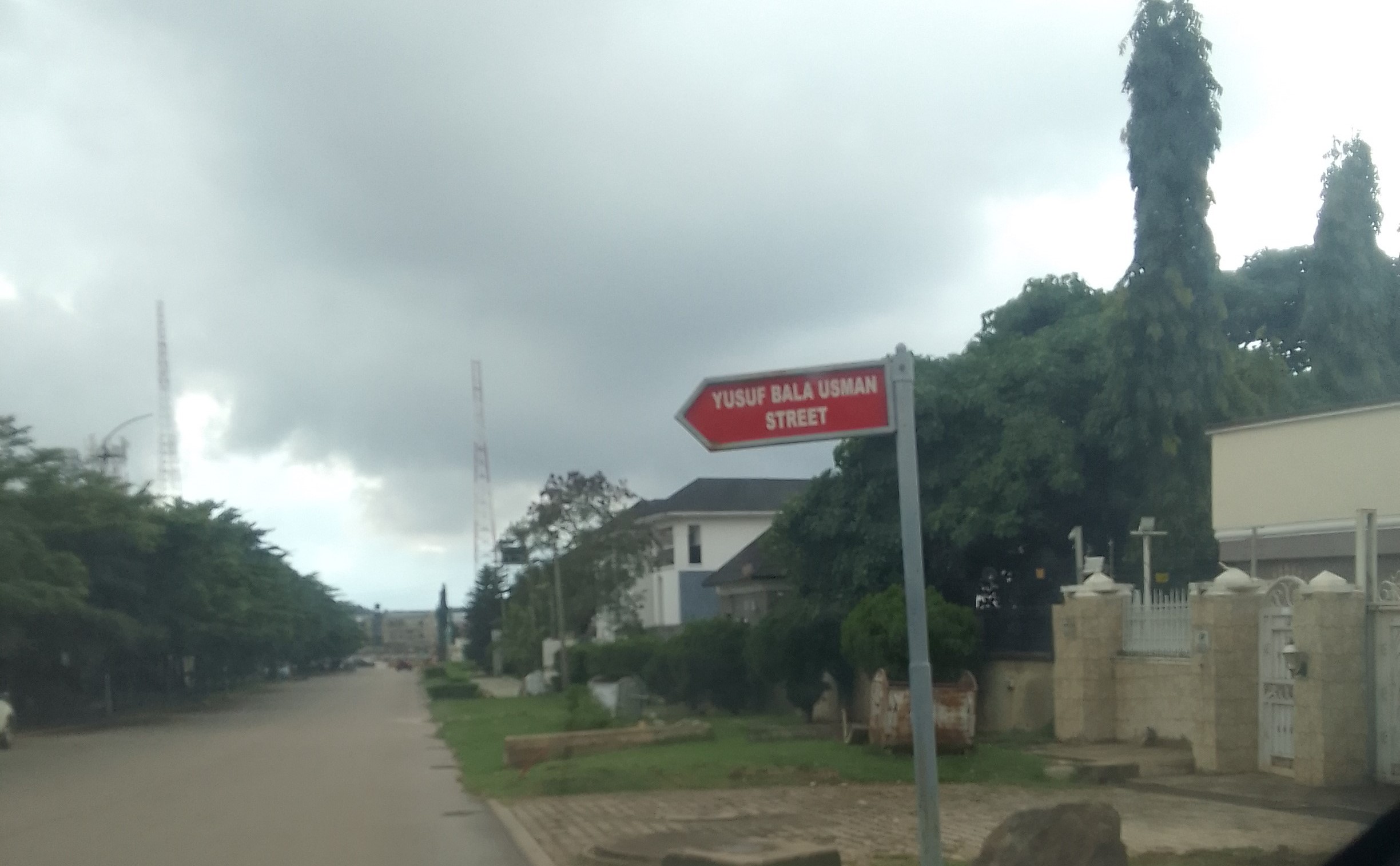Abuja appears to remain the all-time achievement of the Nigerian power elite. It must be the big debate regarding which of Abuja and the Civil War is a greater achievement of the Nigerian ruling class. An analyst may say that if the Civil War went differently, no one would be talking of Abuja today. But so also might another analyst say that Abuja has had a profoundly unifying impact, with the same Igbos in the Civil War emerging with a substantial share of property capitalism in Abuja, for example. That is why it is not going to be an easy debate which of Abuja or the centre’s defeat of Biafran rebellion is a greater achievement as it may seem.

The late Yusuf Bala Usman
In spite of creeping congestion, its own share of insecurity and the buccaneering intrusion in managing a mega metropolis, Abuja still stands as a majestic testimony of ruling class exceptionalism. It is sprawling, always expanding and has developed its own rhythm to give it its own distinctive rhythm compared to other global capitals – Cairo, Johannesburg, New York, Paris, London, Canberra, Sydney, Beijing, Tokyo, Addis Ababa, Amsterdam and where else. Intervention would argue that it is a Nigerian contribution to mega metropolis and global cities.
This is what makes it a big story when it is discovered that Abuja recognised and named a Street after a Yusuf Bala Usman, hereinafter called YBU. The assumption here is that the YBU in the cover picture of this story cannot be other than the Ahmadu Bello University, Zaria historian and radical activist who died on September 24th, 2005. There was an anti-poverty activist also by the name Bala Usman but he had no Yusuf to his name.
YBU remains a complex personality even after his death. There’s no consensus on him at all. Some people see him as the archetypal radical scholar. Others see him as a Fulani chauvinist. He himself saw himself as too contemporary to be regarded as a historian. So, there’s no consensus on and about him at all.
 But the naming of a street after him settles the controversy about him: hate or love him, he was the classic master of the manager of meaning, powerful in his unapologetic standpoint academia. He made his points and didn’t care what any other persons thought about what he had to say. He provoked many controversies, many of which he won, in retrospect. As a scholar-politician in government, he was an unbeatable programmatic framing. People like him who were too sure of their grounds were bound to provoke hostilities against the principles and practices they pushed. He had a lot of that but he was not lazy, always coming out with a position. It is debatable if any other state government in Nigeria and even the Federal Government has brought an agro-industrial transformation package superior to that offered by the Balarabe Musa administration in Kaduna State in the Second Republic, a document to which YBU had a hand in terms of inputs.
But the naming of a street after him settles the controversy about him: hate or love him, he was the classic master of the manager of meaning, powerful in his unapologetic standpoint academia. He made his points and didn’t care what any other persons thought about what he had to say. He provoked many controversies, many of which he won, in retrospect. As a scholar-politician in government, he was an unbeatable programmatic framing. People like him who were too sure of their grounds were bound to provoke hostilities against the principles and practices they pushed. He had a lot of that but he was not lazy, always coming out with a position. It is debatable if any other state government in Nigeria and even the Federal Government has brought an agro-industrial transformation package superior to that offered by the Balarabe Musa administration in Kaduna State in the Second Republic, a document to which YBU had a hand in terms of inputs.
No one would say he or she doesn’t feel his absence today because if he were around, he would leave no one in doubt where he stands on some of the controversies in Nigerian politics today, be it the causes of insurgency all over the place or the outcome of the February presidential election, etc.
 The mention of the outcome of the February presidential election brings to memory the fact that President Bola Tinubu was once the lead discussant at a memorial of the late YBU where he made pronouncements that were, by any means, nationalistic. Is it possible that Tinubu and YBU subscribe to the same lens on the Nigerian crisis or that Tinubu was playing the pragmatic card on the occasion? In other words, what exactly is the link between the President Tinubu who is alive and YBU who is dead?
The mention of the outcome of the February presidential election brings to memory the fact that President Bola Tinubu was once the lead discussant at a memorial of the late YBU where he made pronouncements that were, by any means, nationalistic. Is it possible that Tinubu and YBU subscribe to the same lens on the Nigerian crisis or that Tinubu was playing the pragmatic card on the occasion? In other words, what exactly is the link between the President Tinubu who is alive and YBU who is dead?
Given YBU’s strategy of harassing the power elite to play the historic role that any national elite should play, it might not be too surprising if YBU and Tinubu were not a case of clash but of convergence of perspectives at some broad level. After all, YBU was a member of the Marxist platform which came up with the category of ‘Lagos – Ibadan Financial Oligarchy’ and which Tinubu could be said to epitomise today. Additionally, YBU offered the most comprehensive programme of action on how to actualise June 12, a project Tinubu was tightly involved. The possibility of a plausible convergence between the two at the time of his death can thus not be ruled out. That is not to suggest that he would have accepted Tinubu’s subsidy regime, for example, if he were still alive, given his persistent pro-worker stance throughout his life. The fuel subsidy outing is still what is really puzzling about the Tinubu presidency because the rigging controversy has been impoverished by its protagonists as a result of the deliberate restriction of the charge of rigging to the empirics, with no one asking the transcendental question about it or the condition of possibility that makes it plausible. The implication of not posing that question is that, in 2027, claims and counter-claims of rigging might still be the defining issue in the dynamics of democratisation in Nigeria. That is exactly what the received wisdom calls madness: doing same thing over and over again without the kind of interrogation that will shift the goal post. It makes sense to say that those who destroyed the university system in Nigeria knew exactly what they were doing in the sense that they made possible what YBU called the politics of ignorance.
It must be that precision in framing actual and apparent crisis points that the mega city establishment recognised in YBU as to name a street after him. It is a symbolic concession to someone who was a thorn in the flesh of the establishment, a presence of mind worth commending and celebrating. We all don’t have to agree on everything before we respect and recognise the merits in the other person. After all, a ruling class is only a ruling class to the extent that it is able to absorb and shield all other classes. Naming a street after YBU in Abuja should compel efforts to also replicate that gesture in terms of comprehensive empowerment and emancipation of those who have borne the brunt of failed capitalism in Nigeria, particularly that the (in) security implications of failed capitalism are blowing in everyone’s face.





























1 Comments
Abdullah Musa
YES!